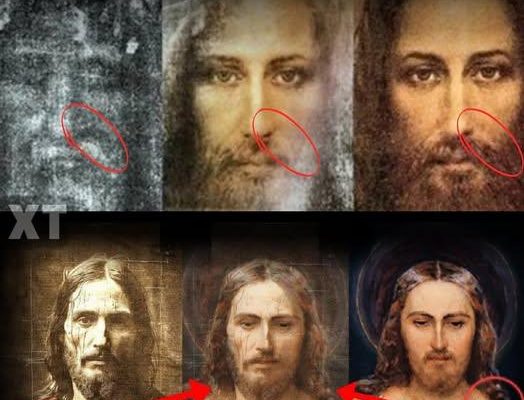Unbelievable! Pilate’s letter reveals shocking details about Jesus’ face and color in detail!
Unbelievable! Pilate’s letter reveals shocking details about Jesus’ face and color in detail!
In the annals of history, few figures have left as profound an impact as Jesus Christ. His teachings, miracles, crucifixion, and resurrection are not just the foundation of faith for billions but also a subject of intrigue and exploration.
Among the many historical accounts surrounding Him, one stands out for its detail and depth—a letter from Pontius Pilate to Emperor Tiberius Caesar, recounting extraordinary events in Jerusalem during Jesus’s final days on Earth.
The Beginning of Pilate’s Account
Pilate begins his letter by describing the extraordinary circumstances he encountered in Judea. From the start of his governance, he faced opposition and tension.
Pilate recounts an incident soon after his arrival in Jerusalem: he hosted a banquet for the city’s leaders, including the high priest and other officials, but they refused to attend. The high priest later claimed religious constraints prevented him from dining with Romans, but Pilate sensed deeper opposition against his authority.
It was against this backdrop of tension that Pilate first heard of Jesus, a preacher from Nazareth drawing large crowds with his teachings. Initially wary of Jesus, Pilate soon realized He was no threat to Roman rule. Instead, Jesus appeared to be a man of peace, more aligned with the Romans than the Jewish leaders who viewed Him with suspicion and hostility.
Pilate’s observations of Jesus went beyond political concerns. He describes Jesus as a striking figure whose presence exuded calm and serenity. Despite facing relentless opposition from the Pharisees and scribes, Jesus remained composed.
Pilate recounts being captivated by the wisdom of Jesus’s teachings, likening them to the greatest philosophers of history. He even sent his secretary to listen to Jesus’s speeches, which impressed him so much that he decided not to interfere with His ministry.
When Pilate eventually spoke with Jesus directly, he was struck by His calmness and clarity. Pilate offered protection to the Nazarene, but Jesus declined, saying that His true refuge was in the heavens. Pilate admired Jesus’s courage and conviction, even as pressure from Jewish leaders to condemn Him intensified.
Pilate’s account of Jesus’s trial and crucifixion reflects his inner conflict. He acknowledges the immense pressure placed upon him by the Jewish authorities, who sought to eliminate Jesus, seeing Him as a threat to their power. Pilate himself found no fault in Jesus and was hesitant to sentence Him to death. However, the political climate and the growing unrest left him with little choice but to acquiesce.
Pilate’s reluctance is evident in his words. He emphasizes that Jesus was never an agitator, and His teachings did not incite rebellion against Rome. Instead, Jesus spoke of a kingdom not of this world—a message of love, peace, and compassion that transcended politics.
Despite Pilate’s attempts to defuse the situation, the crucifixion proceeded. Pilate notes the unusual events surrounding Jesus’s death, including the darkness that covered the land and the earthquake that shook Jerusalem. These phenomena left even the most skeptical witnesses unsettled, hinting at the extraordinary nature of what had just occurred.
After the crucifixion, the story took an even more astonishing turn. Pilate reports that Jesus’s tomb, secured by Roman and Jewish guards, was found empty. The guards described a bright light at dawn and an earthquake that left them unconscious. When they regained consciousness, Jesus’s body was gone. Despite efforts by the Jewish leaders to claim the disciples had stolen the body, Pilate doubted this explanation. The guards, many of whom refused bribes to falsify their accounts, insisted they had witnessed something beyond human comprehension.
Rumors of Jesus’s resurrection spread rapidly through Jerusalem. Pilate writes of how these stories ignited both hope and fear. Some believed Jesus had risen as the Messiah, while others dismissed the accounts as fabrications. Pilate himself was deeply moved by the testimonies. Though skeptical, he could not ignore the overwhelming number of reports from credible witnesses, including some of his own soldiers who claimed to feel a divine presence at the tomb.
The Aftermath in Jerusalem
The resurrection rumors plunged Jerusalem into chaos. Pilate describes the divided atmosphere: on one side were those who believed Jesus was the Son of God, while on the other were those who viewed the movement as a threat to religious and political order. The Jewish leaders were particularly alarmed, fearing that Jesus’s followers might use the resurrection narrative to incite rebellion.
Despite this, Pilate maintains that Jesus Himself was never a revolutionary. His focus was always on spiritual matters, teaching about a heavenly kingdom and encouraging love and forgiveness. Pilate reflects on the paradox of the situation: Jesus, who preached peace, had become the center of a movement that unsettled both religious and political authorities.
In his letter, Pilate admits that the events surrounding Jesus left him deeply shaken. He confesses that, as a Roman governor, he believed in the power of law and order, but what he witnessed in Jerusalem transcended human authority. Pilate writes, “I feel I was merely a witness to an event destined to happen. If Jesus was indeed the Son of God, then His resurrection is an event that transcends politics and law.”
Pilate’s reflections reveal a man grappling with the enormity of what he had witnessed. He acknowledges that Jesus’s name would not fade into obscurity but would echo through generations. “Even if we manage to silence His followers for a time,” he writes, “we cannot erase what happened here. Jesus’s words, His miracles, and most impressively, His resurrection, will continue to resonate.”
The Legacy of Jesus
Pilate’s letter offers a rare glimpse into the impact Jesus had on those who encountered Him, even those outside His circle of followers. It captures the tension, mystery, and reverence surrounding the events in Jerusalem, painting a vivid picture of a time when the world stood at the crossroads of history.
The letter ends with Pilate acknowledging the limitations of his understanding. “May the gods—or the one Jesus called Father—have mercy on us,” he concludes. His words encapsulate the profound mystery of Jesus’s life, death, and resurrection—a mystery that continues to inspire and challenge humanity to this day.
A Testament for All Generations
Pilate’s account reminds us that Jesus’s story is not merely a historical or religious narrative but a call to reflect on the deeper truths of life, love, and faith. Whether viewed through the lens of history, spirituality, or personal growth, His life continues to resonate, urging us to seek a connection with the divine and live with purpose and compassion.
SEE MORE: Finding God in the wildfires

Victims of the Palisades Fire hug during a special Mass for the burned-down Corpus Christi Church at St. Monica in Santa Monica on Jan. 12. (Victor Alemán)
My heart is heavy for all of you who are suffering because of the wildfires that are still burning in the mountains and along the sea. These days are a trial for our great city and for the family of God here in the Archdiocese of Los Angeles.
As the firestorm first hit, I offered a series of Masses to pray for you and our neighbors and for the brave men and women working to put these fires out and keep us safe.
It was an emotional experience for me to meet those of you who have lost so much: loved ones and homes, businesses and livelihoods; parishes, schools, and neighborhoods. It makes me deeply sad to see thousands of LA Catholics and other Angelenos living like refugees and displaced persons in their own hometowns.
We are just beginning to understand the magnitude of the destruction and disruption. These fires have reduced people’s worldly possessions and their most precious memories to ashes and left their futures uncertain. Officials say it may take years to rebuild and that many of our communities may never look the same.
In times like this, it’s understandable that we might question God’s love for us, to wonder where he is while good people are suffering. Why does God allow evil? Why does he allow natural disasters like wildfires and hurricanes, earthquakes, and floods?
There are no easy answers. But that does not mean that there are no answers.
Jesus taught us that God is our Father and that he holds all creation in his loving hands. He promised that not a single sparrow falls from the sky without our Father knowing. Then he reminded us: You are worth so much more than any sparrow.
You are precious to God, each of you. You are so precious to God that he sent his only Son into the world to die on the cross for you. We need to cling to this truth when hardships and sufferings come.
Jesus knows our hopes and dreams and struggles. He is near to us in our joys and in our sorrows.
He has only one will for our lives: that we grow in holiness and love and become saints who share his love here on earth and live forever with him in heaven. Everything that happens, everything he allows, comes from his love for us and his desire for our salvation.
This is not an easy answer, but it is the truth.
The saints teach that while God himself cannot suffer, he does suffer with us.
This is the beautiful truth of the cross. By dying and rising from the dead, Jesus showed us that God can bring good out of even the greatest evil.
And because Jesus conquered death, our own sufferings can find meaning and purpose when we join them with his.
Every crisis is a crossroads. And in every crisis we have a decision to make.
We can respond with anger and despair, and that’s a natural temptation.
Or we can decide to accept our sufferings as somehow sharing in the sufferings of Jesus, who suffers for us and with us and who will never abandon us no matter how dark the path may seem.
Even when we have been left with little, we still have love to give.
We can “offer up” our sufferings in a spirit of love and sacrifice for our neighbors. We can make a gift of our lives to suffer alongside others, supporting them in their struggles.
Again, the saints teach us that the sacrifices we make for others can bear fruits of love and compassion when we unite ourselves to Jesus’ sufferings. In a mysterious way, what we offer in love becomes part of the great treasury of compassion that flows from his sufferings on the cross.
Already in this firestorm, we see the Lord raising up heroic witnesses.
I’m thinking of the family down on their knees in the place where their home once stood, giving thanks to God and Our Lady for sparing them; the parishioners who risked their lives to put out the fire on the church roof; and the firefighters who rescued the tabernacle from a burning church.
We will hear more stories like this in the days ahead. There will be many more sacrifices of love that we will never hear of, all the hidden offerings of parents for their children, all the little unseen acts of kindness in our homes and communities.
Let’s keep helping and supporting one another, let’s keep working together so that our neighbors will know the truth of God’s love in this hour of devastation and loss.
Pray for me, and I will pray for you.
And let us ask Our Blessed Mother to protect and guide us.
Our Lady, Queen of Angels: Be a mother to us all!







